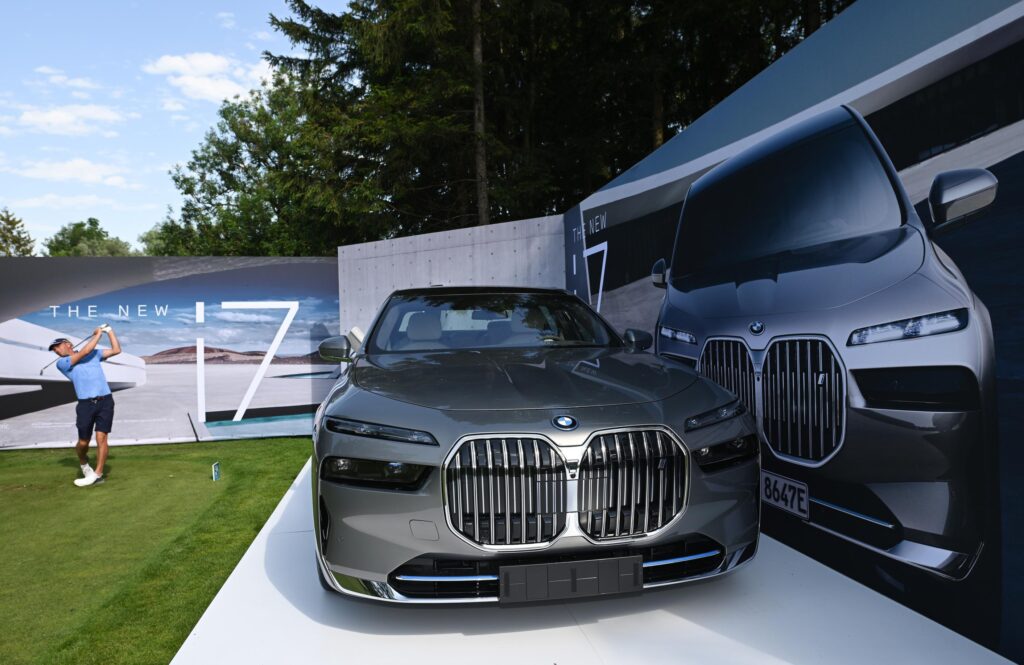
Despite German Auto Maker Strengths, 2023 Profit Prospects Look Challenging

BMW i7 electric car was the hole in one prize at the BMW International Open in Munich, Germany. … [+]
Germany’s auto manufacturers have been reporting healthy profits, but prospects for 2023 look cloudy at best.
Berenberg Bank of Hamburg said Mercedes’ profits in the current quarter look healthy, but next year would be more difficult. Mercedes improved 3rd quarter earnings 83% to €5.2 billion ($5.4 billion) and raised the 2022 profit margin forecast to 13 to 15% from 12 to 14%.
“The semiconductor supply chain continues to keep production volatile, despite the company noting slow improvement that is consistent across the industry globally,” the investment bank said in a report.
“(the) 2023 outlook is still murky. Management (in a call with analysts after the results announcement) withheld commentary on 2023 developments. However, we see a more balanced environment than the one implied by consensus. Headwinds include energy, labor costs and used vehicle prices, with some relief from raw materials and currency. Demand remains uncertain, and we still factor in a worsening mix (more lower-price sales) to be conservative. We retain our 2023 EBIT (earnings before interest and tax) forecast at about €15 billion ($15.6 billion), which implies the segment’s earnings would be 4% lower, year on year,” the Berenberg report said.
The economic recession is beginning to be felt in Europe, led by Germany. On the surface, it looks as though auto sales are likely to stage a recovery. Forecaster LMC Automotive reckons sales in Western Europe next year will notch a healthy looking 11.1% increase to 11.01 million. The trouble is in Western Europe (which includes all the big markets like Germany, France, Britain, Italy and Spain) sales of cars and SUVs have dived from 14.29 million in pre-pandemic 2019. Much of the industry’s production is geared to a market more than 3 million bigger.
“However, even with some improvement assumed next year, the market will remain far below what was considered normal operating volume pre‐pandemic,” LMC said in an earlier report.
Bernstein Research liked what it called Mercedes’ increasing pricing power and cost restructuring which will keep profit margins in double digits in 2023 despite mounting headwinds. Bernstein liked Mercedes’ move to cash in on its premium brand power.
MORE FOR YOU
Mercedes EQS electric car (Photo by Chukrut Budrul/SOPA Images/LightRocket via Getty Images)
“We expect Mercedes to stay true to its premiumization strategy when things go south, which will ultimately protect margins. 2023 will not be as good as 2022. A number of headwinds are looming on the horizon next year, both on the revenue and on the cost side. We believe that some (manufacturers) will fare better than others; Mercedes is one of them. With an improving mix and an improved cost structure, the group probably has what it takes to go through this recession with double-digit margins,” Bernstein Research said.
BMW raised net profit 23% in the 3rd quarter to €3.18 billion ($3.3 billion) compared with the same period last year and expects the profit margin to reach the high-end of 7 to 9% forecast for 2022.
Berenberg Bank expects BMW to be hit by European economic weakness but it has some favorable tailwinds, including upcoming new model launches.
Investment bank UBS agrees that the premium segment will resist weak economies better than the mainstream, and that BMW will underperform Mercedes in what it calls an increasingly well-supplied market.
“BMW is more exposed to entry-premium where we expect consumers to be more negatively affected by the macro situation. We continue to forecast a steep drop in earnings next year as we expect pricing power to erode and finco (the financial subsidiary) earnings to normalize. While valuation remains attractive, we think earnings momentum, and uncertainty about BMW’s electric vehicle competitiveness in China will remain a drag to sentiment,” UBS said in a report.
Volkswagen’s 3rd quarter operating earnings rose 52.6% to €4.3 billion ($4.5 billion) versus the same period of 2021 and after €1.6 billion ($1.7 billion) Russia write-off. The profit margin was 6%, and the 2022 target 7 to 8.5%.
Volkswagen ID.5 electric SUV. (Photo by JENS SCHLUETER/AFP via Getty Images)
In a report headlined “Is it time to buy Volkswagen yet” Bernstein Research said despite the profit increase evidence mounts that 2023 will not be a very good year.
“The list of issues for Volkswagen remain long and its equity story is bleak compared with other European (manufacturers),” Bernstein Research said.
Bernstein answered its question about buying VW with this negative.
“Does anybody need this stock? Volkswagen is a complicated company, has significant risk exposure (mass market, China, software, governance) and lacks a compelling equity story. Other EU (manufacturers) offer a clearer equity profile to buy into – the role Volkswagen could play in a portfolio remains unclear,” Bernstein Research said.
UBS, in an earlier report, said even a premium brand like VW’s Audi was reporting new orders slowing, and VW’s volume brands could lose money next year.
European 2022 auto profits have been inflated by unprecedented factors. The chip shortage halted big overall sales targets and most carmakers had to switch to selling fewer vehicles but made sure they were mainly high-profit margin ones. This is unlikely to continue in 2023.
